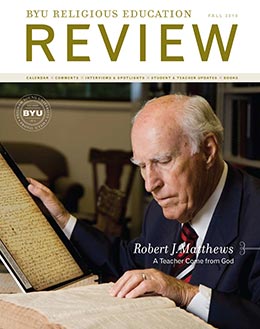Finding Time for Students
Student Section
By Rachael Lynn Moore
RACHAEL LYNN MOORE (rachlynnm@gmail.com) IS A HOME AND FAMILY LIVING MAJOR AT BYU.
While teaching classes, doing research, and participating in their various committees and citizenship responsibilities, many faculty members still find time to act as mentors to students attending the university. One such faculty member is Thomas A. Wayment, professor of ancient scripture and scholar of the New Testament.
Since arriving at the university ten years ago, Dr. Wayment has worked with many students in mentorship settings. When asked how he became a mentor, Dr. Wayment recounts, “For me it is probably a result of what I experienced as a graduate student. I came from a graduate program where there was not a lot of mentoring.” Consequently, when Dr. Wayment arrived at BYU, he immediately began to propose projects in which he could involve students. Through these projects he hopes to help students “gain some real-life experience to help them get into programs and possibly start a publication agenda.”
When asked about the role of a mentor, Dr. Wayment commented that the mentorship process benefits both the individual mentoring and the individual being mentored. As an undergraduate student, Dr. Wayment had the opportunity to work closely with a faculty mentor on preparing a paper for publication. Through this experience, Dr. Wayment gained confidence about his own research and writing abilities. Now as a mentor himself, mentoring has helped Dr. Wayment to keep a fresh perspective in his own research. As he has the opportunity to work with students who are going through the process of publishing for the first time Dr. Wayment becomes reacquainted with the excitement of a first publication. This process reinvigorates him and transforms the everyday humdrum of research into a new experience, adding, “We do so much in this process.”
Dr. Wayment’s areas of expertise are primarily the papyri of the New Testament, apocryphal literature, and the very beginning decades of Christianity. As a result Dr. Wayment frequently works as a mentor with ANES (Ancient Near Eastern Studies) students. Through mentoring environment grants (MEG) Dr. Wayment has had the opportunity to travel with some of his ANES students. A couple of years ago, through the MEG fund, Dr. Wayment and a few students were able to travel to Yale to examine one of the fragments of the Acts of Paul. Dr. Wayment recounts, “The librarian brought it out and treated them like faculty. They were really excited, and we stayed about a day looking at two early fragments. It is great to have a hands-on experience.” Through such experiences, ANES students also practice real application of their Latin, Greek, and Hebrew.
Currently, Dr. Wayment is working on a mentoring environment grant (MEG) with three students. “I’d like them not to do things like book reports or summaries or translations but to actually do the same kind of work I would do.” Dr. Wayment works to start the projects small and then to grow the project, gradually exposing students to more and more. “Ideally,” he says, “such experiences culminate in a joint publication, but because students are so busy, this is not always possible.” However, in three cases students have been able to publish with Dr. Wayment, one of them in a tier-one journal.
Mentoring is one of the rich experiences a university education has to offer to both professors and students. As Dr. Wayment has been an active participant in the process, he has learned patience and the satisfaction of watching younger scholars succeed in the world of academia. Dr. Wayment adds, “At the end of the day, that process has been a lot of fun.
